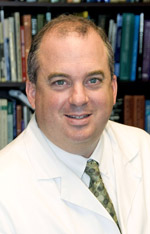Neill Wright, M.D., associate professor of neurological surgery and of orthopedic surgery, has been named the Herbert Lourie Professor in Neurological Surgery at Washington University School of Medicine in St. Louis.
Chancellor Mark S. Wrighton and Larry J. Shapiro, M.D., executive vice chancellor for medical affairs and dean of the School of Medicine, announced the appointment.
Wright becomes the second faculty member to hold the professorship, which was endowed in 1993 by neurosurgeon Shi H. Huang. Huang, M.D., and the professorship’s namesake, Herbert Lourie, M.D., were friends during their neurosurgery residencies at Washington University.

Wright
“As a surgeon, Neill Wright’s innovations have expanded access to treatment for patients with neck and spinal injuries,” Wrighton says. “It’s a pleasure to recognize his outstanding work with this important honor.”
Like Huang and Lourie, Wright was a neurosurgical resident at Washington University. He has been a member of the faculty since 2001.
“In addition to his skills as a physician and surgeon, Neill Wright is also an outstanding educator in the tradition of the previous holder of the Lourie professorship, Robert L. Grubb Jr., M.D,” Shapiro says. “We’re grateful for the opportunity this endowment has given us to remember Dr. Lourie and to recognize Dr. Wright’s many accomplishments.”
“Dr. Wright is an outstanding neurological surgeon who specializes in the management of complex spinal disorders,” says Ralph Dacey, M.D., the Henry G. and Edith R. Schwartz Professor and head of Neurological Surgery and neurosurgeon-in-chief at Barnes-Jewish Hospital. “He is internationally recognized for his innovative approaches to the management of deformities and injuries of the cranial vertebral junction and has developed a completely novel surgical approach for treatment of some of these conditions.”
Wright, who grew up in Southern California, has British parents and holds dual U.S. and British citizenships. He studied at the University of California, Berkeley, as an undergraduate, earned his medical degree at the University of California, Los Angeles, in 1993 and came to Washington University for his medical residency.
“It’s humbling — at the very first departmental function I went to as a medical resident in neurosurgery, I saw Robert Grubb Jr., one of the most respected members of this department, receive the Lourie professorship,” Wright says. “Now that Dr. Grubb has retired, I hope to live up to the standards he set, and I’m grateful to Dr. Dacey, Dean Shapiro and Chancellor Wrighton for selecting me for this honor.”
Much of Wright’s clinical work and research focuses on injuries to the neck, most of which are caused by falls, accidents and other trauma. In 2004, he developed a procedure known as translaminar fixation of the axis that made it possible for more surgeons to repair some types of neck injuries. Other techniques existed for repairing such injuries that were “100 percent successful,” according to Wright, but the technical difficulty of those earlier approaches meant only a small group of surgeons could perform them.
“The process I developed involves a different way of putting screws into the second bone of the neck,” he says. “It’s safe and easy and can be done by surgeons whose skills may not be as specialized or advanced.”
In other research, Wright has been applying a synthetic bone material in spinal surgeries. He and others believe the material may be a safer substitute than bones donated from cadavers and less painful than bone material taken from the patient’s own skeleton.
Washington University School of Medicine’s 2,100 employed and volunteer faculty physicians also are the medical staff of Barnes-Jewish and St. Louis Children’s hospitals. The School of Medicine is one of the leading medical research, teaching and patient care institutions in the nation, currently ranked third in the nation by U.S. News & World Report. Through its affiliations with Barnes-Jewish and St. Louis Children’s hospitals, the School of Medicine is linked to BJC HealthCare.